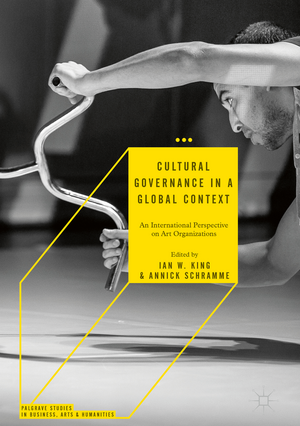Cultural Governance in a Global Context: An International Perspective on Art Organizations: Palgrave Studies in Business, Arts and Humanities
Editat de Ian W. King, Annick Schrammeen Limba Engleză Hardback – 31 ian 2019
Preț: 955.25 lei
Preț vechi: 1164.93 lei
-18% Nou
Puncte Express: 1433
Preț estimativ în valută:
182.79€ • 191.33$ • 152.14£
182.79€ • 191.33$ • 152.14£
Carte tipărită la comandă
Livrare economică 31 martie-14 aprilie
Preluare comenzi: 021 569.72.76
Specificații
ISBN-13: 9783319988597
ISBN-10: 331998859X
Pagini: 325
Ilustrații: XII, 343 p. 34 illus., 33 illus. in color.
Dimensiuni: 148 x 210 mm
Greutate: 0.73 kg
Ediția:1st ed. 2019
Editura: Springer International Publishing
Colecția Palgrave Macmillan
Seria Palgrave Studies in Business, Arts and Humanities
Locul publicării:Cham, Switzerland
ISBN-10: 331998859X
Pagini: 325
Ilustrații: XII, 343 p. 34 illus., 33 illus. in color.
Dimensiuni: 148 x 210 mm
Greutate: 0.73 kg
Ediția:1st ed. 2019
Editura: Springer International Publishing
Colecția Palgrave Macmillan
Seria Palgrave Studies in Business, Arts and Humanities
Locul publicării:Cham, Switzerland
Cuprins
1 Introduction.- 2 Ethiopia.- 3 Taiwan.- 4 China/Hong Kong.- 5 India.- 6 Australia.- 7 South Africa.- 8 Brazil.- 9 Serbia.- 10 USA.- 11 Conclusion.
Notă biografică
Ian W. King is Professor of Aesthetics and Management at the University of the Arts, London, UK and the London College of Fashion. He is also visiting professor at the universities of Antwerp, Belgium; Karlshochschule, Germany; RMIT, Australia and the Shanghai Institute for Visual Arts, China. He is chair of the college research degrees committee and international coordinator of the International Fashion Colloquia series.
Annick Schramme is Professor and Academic Director of the Masters in Cultural Management at the University of Antwerp, Belgium. She also leads the Competence Center Creative Industries at the Antwerp Management School. She has published on arts policy, international cultural policy, heritage, cultural governance, leadership, cultural entrepreneurship, and the creative city etc. From 2004-13 she was advisor-expert to the Vice-Mayor for Culture and Tourism of the City of Antwerp.
Textul de pe ultima copertă
This original book explores the character of cultural governance of arts and cultural institutions in eight countries across five continents. Examining strategy and decision-making at an organisational level, this is the first empirical contribution on cultural policy and management, revealing how it is applied across the globe in otherwise unexplored countries. Concerned with the assumption that ‘one-size fits all’, the chapter authors analyse how cultural governance is managed within arts organizations in a range of countries to assess whether some locations are trying to apply unsuitable models. The chapters aim to discover and assess new practices to benefit the understanding of cultural governance and the arts sector which have as yet been excluded from the literature. As a collection of local accounts, this book offers a broad and rich perspective on managing cultural governance around the world.
Caracteristici
First empirical examination of cultural governance on an organisational and international level Explores cultural governance 8 countries across 5 continents for a truly global perspective Provides local accounts of challenges and responses to the implementation of cultural governance








